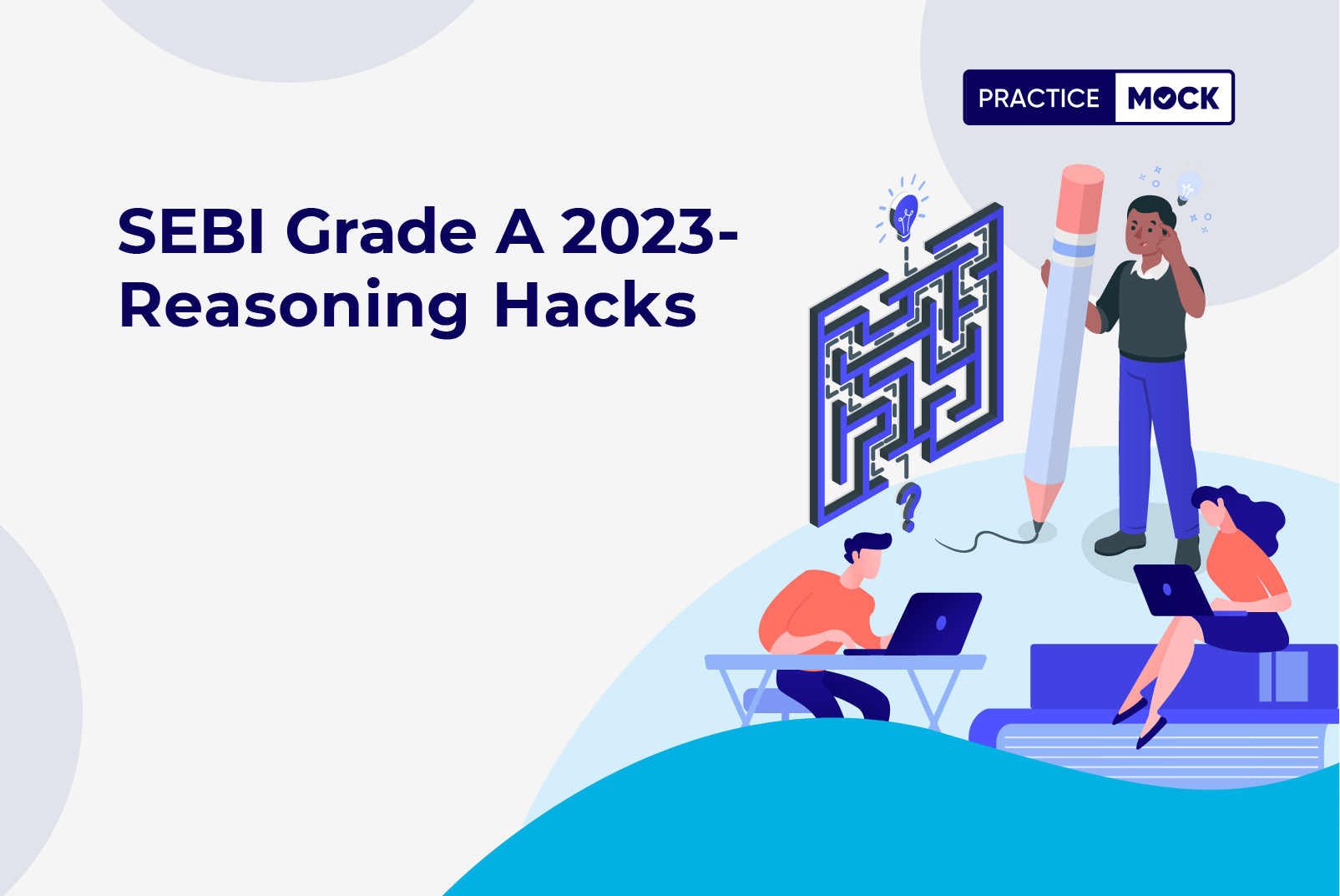The Securities and Exchange Board of India (SEBI) is one of the regulatory bodies that works under Govt. of India. It performs the task of protecting the interests of investors in securities, promoting the development of the securities market, and regulating the securities market and related matters. The SEBI Grade A examination is conducted for the recruitment of officers in various streams of SEBI, such as General, Legal, Information Technology, Engineering, Research and Official Language. For more information about the SEBI Grade A syllabus, exam pattern etc., please click the link below:
SEBI Grade A – An Overview – PracticeMock
In this post, I am covering the reasoning topics which are included in SEBI Grade A Examination.
What is the Purpose of the Reasoning Test?
The purpose of the reasoning test is to evaluate candidates’ cognitive ability. Cognitive ability can be defined as a general mental capability involving reasoning, problem-solving, planning, abstract thinking, complex idea comprehension, and learning from experience (Gottfredson, 1997).
Source: Why is scientific reasoning so hard, and what can we do about it? – NASA/ADS (harvard.edu)
SEBI Grade A Reasoning Topics
Some of the most common topics asked in the SEBI Grade A Exam are as follows:
Take a FREE Mock Test of SEBI Grade A & Compare Your Score with the Topper
Direction Sense
These questions are designed to test the candidate’s ability to understand and follow directions. Questions in this section typically involve finding the shortest path between two points or determining the direction of travel.
Blood Relations
Questions related to blood relations aim at testing the candidate’s ability to understand and apply family relationships. Questions are concerned with determining the relationship between two people or finding the missing person in a family tree.
Syllogisms
These questions are designed to test the candidate’s ability to decide whether a statement is true or false to identify the missing premise.
Puzzles
These questions test a candidate’s ability to think outside the box and to solve problems that are not immediately obvious. Questions in this section typically involve finding patterns, completing sequences, or making connections between seemingly unrelated objects.
Seating Arrangements
Reasoning questions about seating arrangements test the candidate’s ability to visualize and track the movement of people in a given space. Questions in this section typically involve determining the seating arrangement of a group of people or finding the person who is sitting in a specific seat.
Take a FREE Mock Test of SEBI Grade A & Compare Your Score with the Topper
Order and Ranking
Such questions test the candidate’s ability to compare and rank objects or people. Questions in this section typically involve determining the order in which a set of objects or people should be ranked or finding the highest or lowest-ranking object or person.
Coding-Decoding
Coding-Decoding tests the candidate’s ability to decode messages that have been encoded using a specific code. Questions in this section typically involve decoding messages that have been written in a secret code, or determining the code that was used to encode a message.
Machine Input-Output
Input-Output tests the candidate’s ability to understand and interpret machine input and output. A candidate has to find the input that is required to produce a specific output or find the output that will be produced by a given input.
Inequalities
These questions test the candidate’s ability to solve inequalities. Here a candidate has to find out whether a given inequality is true or false by finding the solution to an inequality.
Alpha-Numeric-Symbol Series
Alfa-Numeric-Symbol-Series tests the candidate’s ability to identify patterns in alpha-numeric-symbol series. Questions in this section typically involve determining the next number in a series or finding the missing number in a series.
Take a FREE Mock Test of SEBI Grade A & Compare Your Score with the Topper
Data Sufficiency
With data sufficiency questions the candidate’s ability to determine whether the information given in a set of statements is sufficient to answer a question is evaluated. Now this section involves deciding whether the answer to a question can be determined from the given information, or whether more information is needed to answer the question.
Number System and Conversions
This topic tests the candidate’s knowledge of number systems and conversions. Questions in this section typically involve converting numbers between different bases or determining the value of a number in a given base.
Takeaways
The reasoning section of the SEBI Grade A exam is considered tough. However, with proper strategy and planning it can become easier to score high in the competitive stakes. We are here to help you with this. Try our FREE Mock test of SEBI and evaluate where you stand on your journey. You may also try our Free Quizzes that bring out significant improvement in the candidate’s ability to approach the topics. Keep taking mock tests, keep prepping and reach out to us for any assistance with regard to our courses. All the best!
- Sign Up on Practicemock for Updated Current Affairs, Free Topic Tests and Free Mini Mocks
- Sign Up Here to Download Free Study Material
Free Mock Tests for the Upcoming Exams
- IBPS PO Free Mock Test
- RBI Grade B Free Mock Test
- IBPS SO Free Mock Test
- NABARD Grade A Free Mock Test
- SSC CGL Free Mock Test
- IBPS Clerk Free Mock Test
- IBPS RRB PO Free Mock Test
- IBPS RRB Clerk Free Mock Test
- RRB NTPC Free Mock Test
- SSC MTS Free Mock Test
- SSC Strenographer Free Mock Test
- GATE Mechanical Free Mock Test
- GATE Civil Free Mock Test
- RRB ALP Free Mock Test
- SSC CPO Free Mock Test
- AFCAT Free Mock Test
- SEBI Grade A Free Mock Test
- IFSCA Grade A Free Mock Test
- RRB JE Free Mock Test
- Free Banking Live Test
- Free SSC Live Test




